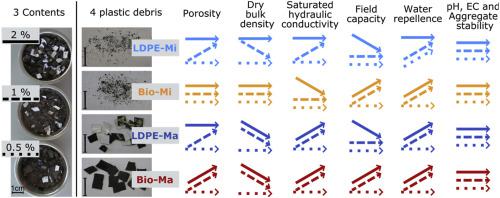Environmental Pollution ( IF 7.6 ) Pub Date : 2020-06-30 , DOI: 10.1016/j.envpol.2020.115097 Yueling Qi 1 , Nicolas Beriot 2 , Gerrit Gort 3 , Esperanza Huerta Lwanga 4 , Harm Gooren 5 , Xiaomei Yang 6 , Violette Geissen 5

|
The plastic mulch films used in agriculture are considered to be a major source of the plastic residues found in soil. Mulching with low-density polyethylene (LDPE) is widely practiced and the resulting macro- and microscopic plastic residues in agricultural soil have aroused concerns for years. Over the past decades, a variety of biodegradable (Bio) plastics have been developed in the hope of reducing plastic contamination of the terrestrial ecosystem. However, the impact of these Bio plastics in agroecosystems have not been sufficiently studied. Therefore, we investigated the impact of macro (around 5 mm) and micro (<1 mm) sized plastic debris from LDPE and one type of starch-based Bio mulch film on soil physicochemical and hydrological properties. We used environmentally relevant concentrations of plastics, ranging from 0 to 2% (w/w), identified by field studies and literature review. We studied the effects of the plastic residue on a sandy soil for one month in a laboratory experiment. The bulk density, porosity, saturated hydraulic conductivity, field capacity and soil water repellency were altered significantly in the presence of the four kinds of plastic debris, while pH, electrical conductivity and aggregate stability were not substantially affected. Overall, our research provides clear experimental evidence that microplastics affect soil properties. The type, size and content of plastic debris as well as the interactions between these three factors played complex roles in the variations of the measured soil parameters. Living in a plastic era, it is crucial to conduct further interdisciplinary studies in order to have a comprehensive understanding of plastic debris in soil and agroecosystems.
中文翻译:

地膜碎片对土壤理化水文特性的影响。
农业中使用的塑料地膜被认为是土壤中塑料残留物的主要来源。使用低密度聚乙烯 (LDPE) 进行覆盖已被广泛采用,农业土壤中产生的宏观和微观塑料残留物多年来一直引起人们的关注。在过去的几十年中,人们开发了各种可生物降解 (Bio) 塑料,以期减少对陆地生态系统的塑料污染。然而,这些生物塑料对农业生态系统的影响尚未得到充分研究。因此,我们研究了来自 LDPE 和一种淀粉基生物地膜的宏观(约 5 毫米)和微观(<1 毫米)塑料碎片对土壤理化和水文特性的影响。我们使用了与环境相关的塑料浓度,范围从 0 到 2% (w/w),通过实地研究和文献回顾确定。我们在实验室实验中研究了一个月的塑料残留物对沙质土壤的影响。4种塑料碎屑存在时容重、孔隙率、饱和导水率、田间持水量和土壤斥水性均发生显着变化,而pH值、电导率和团聚体稳定性未受到显着影响。总体而言,我们的研究提供了明确的实验证据,表明微塑料会影响土壤特性。塑料碎片的类型、大小和含量以及这三个因素之间的相互作用在测量土壤参数的变化中起着复杂的作用。生活在塑料时代,











































 京公网安备 11010802027423号
京公网安备 11010802027423号